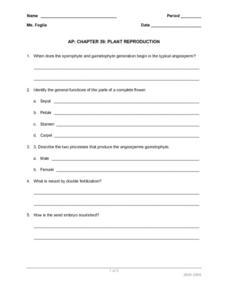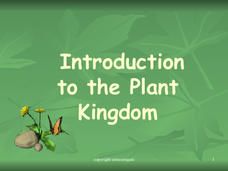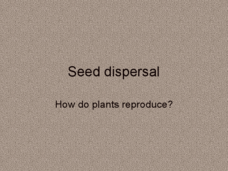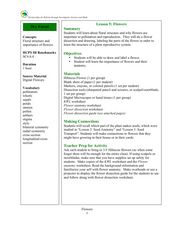Pace University
Grade 6-8 Living Things
What characterizes a living thing? Scholars explore the concept during a differentiated instruction unit on living things. They perform lab experiments to determine how animals adapt to stimuli, watch videos and learn about...
Scholastic
Study Jams! Flowers
RJ hangs out in Zoe's garden as she explains pollination, flower anatomy, and fertilization. This cartoon-styled feature is sure to stay in your botanists' minds! Follow it with the dissection of large flowers, such as the lily.
Curated OER
AP: Chapter 38: Plant Reproduction
Short, but sweet, this handout questions the learner on the structures and processes of plant reproduction. Budding botanists draw a dicot seed, label a flower diagram, and describe the functions of different flower parts. It also covers...
American Museum of Natural History
What's This? Reproduction
Attracting the right mate is as important for humans as any other species. An interesting lesson teaches individuals about several strategies that animals and plants have adapted to attract their mates. From colorful nests to powerful...
Biology Junction
Introduction to the Plant Kingdom
Plants provide humans with food, shelter, and medications. Scholars gain a better appreciation for plants after learning their functions, divisions, and early ancestors. Each sub-topic includes slides highlighting vocabulary and...
Biology Junction
Nonvascular and Simple Vascular Plants: Mosses to Ferns
Sometimes conservationists use specific plants to prevent erosion or fight invasive species. A 50-slide presentation covers both nonvascular and vascular plants. It discusses the plants, their stages and life cycles, reproduction, uses,...
Teacher Web
Plant Reproduction—Structure of a Flower
What happened to the plant in math class? It grew square roots. Here, a set of 11 worksheets provide a review of plant reproduction. It includes the structure of a flower and each part's function, pollination, fertilization, seed...
Terminix
The Pollinator
What do bees and children have in common? They both love their sweets. Decorate a flower pot or bucket to look like a brightly colored flower and fill it with wrapped candy and cheese puffs. Have learners reach into grab the candy,...
Curated OER
AP: Chapter 29 and 30: Plant Diversity
It's a jungle out there! That is because of the tremendous diversity among plants. In this AP biology assignment, botanists answer questions about plant evolution, diversity, and reproduction. They differentiate between monocots and...
Curated OER
Bee Pollen Popular
The world would be a much different place without the help of pollinators. Read about the important role bats, hummingbirds, and various insects play in plant reproduction, exploring the interdependence of living things in an ecosystem....
Curated OER
Introduction to Plant Reproduction
Eight objectives pertaining to plant reproduction are stated and addressed in this presentation. Objectives include defining sexual and asexual reproduction, comparing monocots to dicots, explaining flower types, and more. Some of the...
Curated OER
Seed Dispersal: Plant Reproduction
How do seeds get from a plant to the ground so they can germinate? This presentation provides the answer to seed dispersal in relation to plant reproduction. Straightforward explanations and definitions for wind, animal, burial, fruit,...
Curated OER
What Makes a Plant a Plant?
For a plant unit in your biology curriculum, here is a slide show that bestows the basics of plant structure, reproduction, and classification. The information is general. The main point of the lesson is to highlight what characterizes...
Curated OER
Review of Plants
In this plant science activity, students complete 45 multiple choice questions on plant reproduction and different plants of a plant.
Curated OER
The Great Pollinators
Students discover the reproductive parts of a plant. In this biology lesson, students identify and categorize several different plants they dissect in class. Students record their information using a data chart.
Curated OER
Plant Reproduction Chapter #4
The only way to employ a plant reproduction presentation void of pictures is to support it with actual sample flowers. Botany beginners learn about plant reproduction through an underdeveloped outline of flower structures, reproductive...
Curated OER
Dry Forest: Flowers
Students explore botany by examining diagrams. In this plant reproduction activity, students define a list of plant vocabulary terms and identify plant anatomy from a diagram. Students complete several plant activity worksheets and study...
Curated OER
Plant Reproduction
In this plant reproduction learning exercise, students follow the steps to complete a science investigation and then respond to 2 short answer questions and complete a data table regarding the investigation.
Curated OER
Flowers and Reproduction
In this plant reproduction instructional activity, students review the stages of the reproductive cycle of flowering plants. This instructional activity has 1 matching, 1 short answer, and 1 true or false question.
Curated OER
How Can Plants Be Grouped?
In this plant classification worksheet, students compare plants with flowers and plants with cones by filling in the blank of 7 statements.
Curated OER
What is a Plant?
In this plant worksheet, 5th graders will use a word bank to label 6 parts of a plant. Then students will label 5 plant reproductions statements as true or false.
Curated OER
Plant Life
In this plant instructional activity, students will review plant classification by comparing plant characteristics. Students will determine what is needed for photosynthesis to occur. Students will also explore plant transpiration and...
Curated OER
Science Test-Plant Life Cycle
In this Life Science worksheet, 8th graders match the vocabulary with the list while being tested on terms related to plant reproduction.
Curated OER
From Seeds to Plants
Second graders review the process of plant reproduction and the role of seeds in that process. The students dissect a seed, analyze their finds, collect and record data, and make predictions about seed germination and plant growth.

























